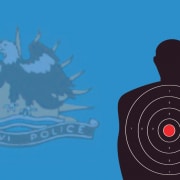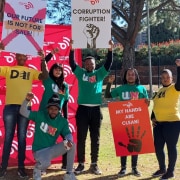|
Getting your Trinity Audio player ready...
|
Image: Abahlali baseMjondolo
A report released in August 2024 once again casts light on the disproportionate victimisation, harassment, and killings of members of Abahlali baseMjondolo (Abahlali), South Africa’s largest social movement representing the interests of shack dwellers, the homeless, and the poor. The organisation supports millions who have lost hope for a better life and who believe the government has forgotten about them.
The report also highlights authorities’ lackadaisical attitude towards the ongoing violence, and the failure to make even desultory attempts to address it.
The report, released by Amnesty International on 29 July 2024, is titled Our lives count for nothing and subtitled Threats, attacks, and killings of members of Abahlali baseMjondolo (shack dwellers) movement in South Africa’s Kwazulu-Natal [KZN] province. It focuses on the eKhenana settlement in Cato Manor, not far from the eThekwini city centre, because, as Amnesty points out, the most recent killings have taken place there.
“The report serves as a representation of the wider risks and challenges experienced by the movement, examining the killings and patterns of threats and attacks against Abahlali members in eKhenana, and the state’s failure to adequately respond to it.”
KZN is described by Amnesty as a volatile province, “rife with politically motivated killings”. Data released in 2022 by the Global Initiative Against Transnational Organized Crime show that is it the province with the greatest frequency of politically linked assassinations in South Africa. “Data collected … since 2000 shows a marked increase in the number of assassinations, especially since 2015. Of the 418 political hits recorded nationwide between 2000 and 2021, 213 took place in the last seven years, and of that number, 118 were in KZN.”
The Moerane Commission, established in 2016 for the specific purpose of probing the ongoing political killings in KZN, had found much the same when it released its final report in 2018, going as far as to paraphrase Shakespeare’s Hamlet.
“Regrettably, there does not seem to be any reduction in the rate of the murder of politicians in KZN. There is still something rotten in the Province of KwaZulu-Natal.”
Resistance
Under normal circumstances, eKhenana would be seen as “a cooperative, working commune, where residents have established a communal vegetable garden, communal poultry farm, communal kitchen, a communally run tuck shop, a creche, and even a political school, organising themselves outside of formal party politics”.
The land on which the community lives is owned by eThekwini municipality. Since its establishment, however, the municipality has conducted “a series of brutal and unlawful evictions” in the community, tearing down and burning shacks without so much as a court order.
Abahlali applied for, and was granted, an interdict in 2018 with the help of the Socio-Economic Rights Institute (Seri) of South Africa – but the evictions continued. It took another two court applications, in 2019 and 2020, and further interdicts before the municipality finally agreed to stop demolishing the informal houses.
This is a typical pattern. Since its inception, Abahlali has “faced resistance from individuals who are challenged by its activism. This resistance, and the situation of vulnerability of its members, has created an environment prone to threats, attacks, unlawful evictions, trumped-up legal charges, harassment, attempted murders, and killings in response to their activism over the past 18 years”, the report states.
Abahlali has lost 25 leaders to assassinations over the past 15 years – three over a six-month span in 2022 alone. The organisation has reported eight killings in eKhenana since its establishment in 2018, five of which were linked by community members to the individual’s activism, in interviews with Amnesty International.
Little has been done to hold the perpetrators to account.
Shenilla Mohamed, the executive director of Amnesty’s South African branch, said at the report’s launch: “The authorities are failing to protect members of the Abahlali baseMjondolo movement who play a crucial role in ensuring accountability and advancing human rights and social justice.”
Police implicated
The South African Police Service was heavily implicated not only in the failure to protect the activists, but also in actively preventing justice from taking its course. Some of its members have tried to help Abahlali but for the most part, the opposite is true.
“Allegations of police refusing to open investigations into threats and attacks on members of Abahlali, failing to collect evidence, and failing to conduct thorough and efficient investigations and make arrests were a common theme in all the interviews conducted for this research,” the report reveals.
Furthermore, the report adds, alleged perpetrators of the killings are said to be known to the community and, while evidence exists, the police have made no attempt to collect it or act on it.
Meanwhile, “Police are quick to open cases against people affiliated with Abahlali, yet if anyone from the movement tries to get a case opened for the threats they received, they are met with multiple challenges, including the refusal to open cases.”
For the eKhenana victims, there has only been justice for Ayanda Ngila, who was killed in March 2022. In July 2023, Khayalihle Gwabuzela, widely known as Khaya Ngubane – a member of the ANC Youth League at the time – was found guilty of his murder and sentenced to 15 years in prison.
Two suspects for the murder of Nokuthula Mabaso – shot five times in front of her children in May 2022 – were released apparently because the postmortem report disappeared, according to interviewees. Three months later Lindokuhle Mnguni was shot in his home.
“At the time of publication, the South African Police Service, Minister of Police, and the National Prosecuting Authority had not responded to these allegations,” states the Amnesty report.
Activists under fire
The report is not the first intervention in this long-standing threat to activists’ safety. Over the years, Abahlali has received support from numerous other organisations, particularly Seri, who have stood against the constant victimisation.
In September 2022 Corruption Watch and more than 100 other civil society organisations supported a letter from Seri, sent on Abahlali’s behalf to various members of the government who today serve, for the most part, in different capacities. They included then National Assembly speaker Nosiviwe Mapisa-Nqakula, justice minister Ronald Lamola, police minister Bheki Cele, and the Presidency, among others.
The letter condemned the government for allowing the targeting of the human rights defenders and called for urgent national intervention and protection for the people on the ground, as well as investigations into the ongoing attacks on members of the organisation.
“On at least one occasion – the killing of Thuli Ndlovu – two councillors of the ANC were found to be behind the attacks and were convicted in 2016. In other killings, local ANC leaders have also been implicated.”
South Africa’s government is constitutionally and legally required to ensure the rights of everybody to privacy, freedom of expression, assembly, and association, dignity, and life. Despite these constitutional requirements, Abahlali members are not the only ones under attack.
The murder in January 2023 of human rights lawyer Thulani Maseko sent a wave of outrage across the Southern African region and prompted organisations and individuals alike to call for swift justice. The murders of Abahlali community activists Mabaso and Thuli Ndlovu, environmental activist Fikile Ntshangase of the Mfolozi Community Environmental Justice Organisation, and whistle-blower Babita Deokaran are just a few among an increasing number of women killed for their activism.








